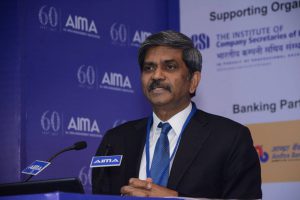Excerpts from the Q & A session between Pankaj Bansal, Co-Founder & CEO, People Strong and D Shivakumar, Group Executive President – Corporate Strategy & Business Development, Aditya Birla Management Corporation Pvt Ltd at AIMA’s 15th National HRM Summit 2017.

D Shivakumar, Group Executive President – Corporate Strategy & Business Development, Aditya Birla Management Corporation Pvt Ltd. at AIMA’s 15th National HRM Summit.
When we reimagine HR, what do you think should HR stop doing?
I think HR is very important and should evolve with the times. I talk to a number of people across the industry, and I would say that in many organizations, HR is seen as a political unit. Why do people feel that? First HRs should rid themselves of politics. HR has a lot of confidential information, HR should not trade in that. The HR department should be staffed with people who can maintain high confidentiality. The biggest problem in every company is that people say HR people blabber, and hence they do not trust them. So the dividing line between a good performer who needs to be promoted and somebody who doesn’t need to be promoted etc. is becoming a problem.
So if you don’t have people with very high integrity who have high trust in the organization, the HR department is doomed to fail. What more should an HR department do? The HR department has only 3 alphabets, C, D, and E, (Culture, Diversity & Engagement). Harnessing Culture and filling the organization with Diversity is their job. Don’t go for the same people, the IITs, and IIMs. Bring in a diverse workforce, because the challenges of tomorrow require a diverse way of thinking, and ease of engagement. So it’s a culture, diversity, and engagement, everything is fine if we can score high on these three. More than anything else, HR department must be like Caesar’s wife, it should be above suspicion.
How much transparency one can have in an organization? Instead of focusing on business why are we focusing on transparency?
Why do employees come and work for the company? The first thing is that they believe in the purpose of the company, they believe that the purpose and direction of the work are worthwhile. The second reason they come to work is good people, good colleagues, and good culture. The third reason is, they believe that if they do something there will be progress and acknowledgment. So in this world of purpose, you have to give them as much data, because they can always source data from somewhere else. They’d rather hear it from you first if they hear it from you, they tend to trust you more. If they keep hearing from outside sources about you, then they’ll say why am I working in this company. I think there are no limits to pushing transparency in a digital world. For example, I think there are many companies where the salaries have come up on Google, now I don’t know how they’ve landed up there but they’ve landed up. You should give them whatever gives them peace of mind and a sense that I will stay with this company because it’s open and transparent.
In today’s context, as a CEO, what are the three or four things that you would measure HR on?
The first thing I always evaluate an HR person on is, that he must be aligned with the business. He must truly understand the business and the levers of the business, meet the customers regularly and because without business there is no HR. So you must always be aligned with the business. Unfortunately in a matrix world that’s not happening HR is becoming its own vertical and doing things on its own. It has to be aligned with the business and I say that for every department which is in the matrix but more so for HR.
We are tending to measure everything and therefore we’ve lost the meaning of everything that’s the problem we are facing right now as leaders. We measure a lot without really realising the meaning. For example, what’s the meaning of work? why does somebody come to work? What’s the meaning of contribution? What’s the meaning of productivity? So to me, the second thing I’ll hold a person accountable for is developing a culture which drives accountability, responsiveness, and productivity.
So two things, aligned to business and developing a culture which ensures the organisation is far more competitive than others.
We treat our customers so well but the employee is still seated as a second rate citizen. Why a different treatment for customers and employees?
If I treat someone as a volunteer I’ll treat them differently and if I treat them as bonded labor I’ll treat them differently. People are free agents you cannot buy them with money or shares. The millennials, don’t understand pension, insurance, and gratuity. They think these are old concepts. So you can’t buy people with money and hold them hostage. Those days of hostage HR are over.
Watch the full video on our YouTube channel –


